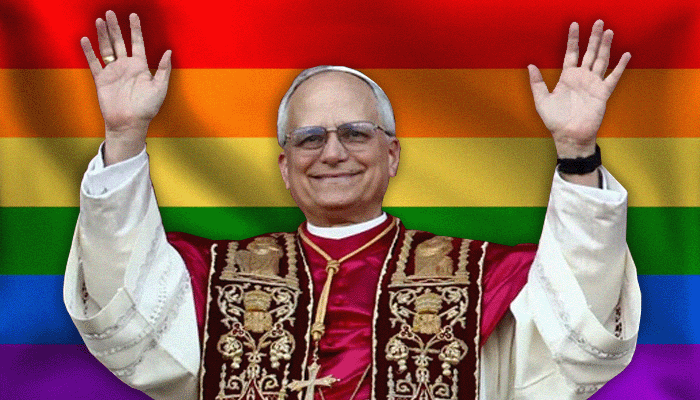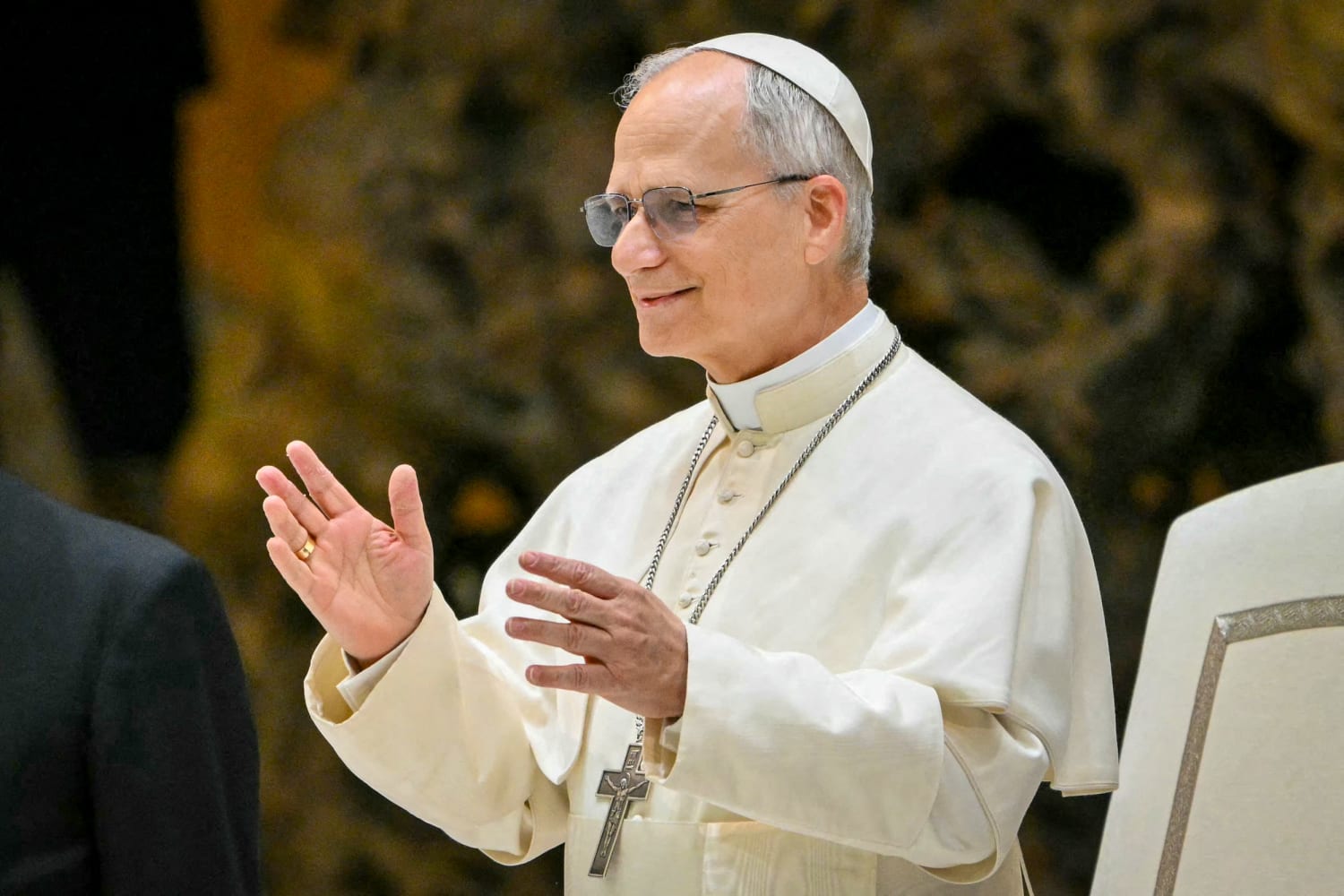LATEST — “The Family is Built on the Union of a Man and a Woman”: Pope Leo XIV Reaffirms Catholic Doctrine in Bold Global Address, Calls for Dialogue Amid Cultural Tensions
By Staff Writer | Global Faith & Society Desk
Vatican City — May 26, 2025
In a landmark address delivered before tens of thousands gathered in St. Peter’s Square, Pope Leo XIV made a sweeping, theologically grounded reaffirmation of the Catholic Church’s long-standing teachings on marriage and family. With a solemn voice and deliberate cadence, the Pontiff declared:
“The family is built on the union of a man and a woman. This is not merely tradition — it is truth, written in the very grammar of creation.”
The statement, while echoing the language of previous pontiffs, arrives in a world vastly more pluralistic, fractured, and ideologically volatile than any of his predecessors may have imagined. And it may very well define the tone and trajectory of a papacy still in its infancy.
Yet Pope Leo XIV’s address was not merely a reiteration of doctrinal orthodoxy. Beneath the firm theological surface was a carefully measured appeal for civility, understanding, and compassion in a culture increasingly shaped by sharp divisions over gender, identity, and the definition of family.

It was, in effect, a moral manifesto for an age of confusion.
Theological Foundations and Anthropological Convictions
The heart of the Pope’s message lies in what Catholic theology calls natural law — the belief that human beings, created by God, possess an inherent structure and moral order discernible through reason. Marriage between a man and a woman is, in this framework, not simply a religious symbol but a universal reality rooted in nature itself.
“Male and female He created them,” Pope Leo quoted from Genesis, before adding, “It is not the Church that defines this; it is the Creator who reveals it.”
The Pope described marriage as a “sacramental covenant,” uniquely designed for the procreation of life and the education of children — a structure he argued provides society with its most stable and enduring foundation. “When the family weakens,” he warned, “civilization itself begins to fracture.”
While these convictions are not new in Catholic thought, the rhetorical clarity and global stage from which they were delivered gave them renewed force. Pope Leo XIV appears determined not only to preserve the deposit of faith but to reassert it as a counter-narrative to modern secularism.
A Papacy at a Crossroads: Between Continuity and Compassion
Yet to interpret the Pope’s address as merely a conservative salvo would be to miss the broader vision he is cultivating.
At several points in his speech, Leo XIV departed from doctrine to speak directly to those who have felt alienated or condemned by the Church. “We must never confuse truth with contempt,” he said. “To uphold the beauty of God’s design does not require us to belittle others. Every person, regardless of gender or experience, is a beloved child of God.”

These words — carefully chosen — represent a hallmark of his early papacy: a fierce fidelity to truth, tempered by pastoral tenderness. He is neither a doctrinal revolutionary in the mold some hoped for after Pope Francis, nor a culture warrior in the style of certain bishops and cardinals. Instead, Leo XIV is positioning himself as a reconciling voice between conviction and compassion.
This dual strategy has drawn admiration from some and skepticism from others.
The Global Reaction: A Church Divided and a World Watching
Responses to the speech came swiftly — and predictably — from across the globe.
In much of the Global South, where Catholicism is thriving, bishops and laypeople alike welcomed the Pope’s firmness. Cardinal Jean-Marie Mbaye of Senegal stated, “We are grateful for a Holy Father who speaks clearly. In Africa, the family is under attack from outside ideologies. The Pope’s message is a defense of our future.”
In conservative Catholic communities in Eastern Europe and Latin America, the speech was seen as a necessary correction to what many perceive as the ambiguity of the Francis years.
But elsewhere, particularly in Western Europe and North America, the reaction was sharply critical.
“Once again,” said Father James Delaney, a Jesuit theologian based in New York, “we see a Church that speaks of love, but whose structures and language continue to marginalize LGBTQ Catholics and non-traditional families.”
The disappointment was even stronger among advocacy groups. “Pope Leo’s words are a denial of reality,” said Andreja Kozar, spokesperson for Inclusive Church Now. “Millions of families across the world are not built on a man and a woman — they are built on love, commitment, and dignity. Why can’t the Church see that?”
These reactions underscore a deep and widening rift: between a Church that sees itself as the guardian of eternal truth and a society that increasingly views identity as self-defined, plural, and evolving.

From Doctrine to Diplomacy: Navigating a Secular Age
In the broader context of the Church’s global mission, Leo XIV’s message raises an urgent question: Can Catholicism still speak with moral authority in a post-Christian world?
The Pope’s answer appears to be: not only can it — it must.
In today’s address, he likened the Church to a “lighthouse in the storm,” insisting that the truth of human nature and divine purpose cannot be rewritten by cultural trends or political pressures. “To alter the design of the Creator,” he said, “is not to progress — it is to dismantle what we most need to survive.”
But he was also keenly aware of the cost of dogmatism. In a moment of striking humility, Leo XIV acknowledged that many have been hurt by the Church’s past rhetoric. “We have not always spoken with the love that truth demands. For this, we ask forgiveness. And we begin anew.”
This language — contrite, honest, but uncompromising — reflects a Pope deeply committed to repairing the Church’s credibility without diluting its teachings.
A Defining Moment for a Defining Papacy
Pope Leo XIV’s address marks a decisive moment in the early months of his pontificate. It draws a clear line on one of the most contentious issues of our age, while refusing to turn that line into a wall.
In doing so, he has revealed the contours of his papal vision:
-
A Church rooted in theological clarity but willing to listen;
-
A doctrine proclaimed with conviction but applied with mercy;
-
A faith not shaped by the world, but not closed off to it either.
The challenges ahead are enormous. From synodal debates on inclusivity to global questions about gender, bioethics, and the very nature of humanity, the Catholic Church is entering what may be one of the most morally turbulent decades of its existence.
Leo XIV has chosen not to wait for the storm to pass. He is speaking into it — with scripture in one hand and an open heart in the other.
Whether his approach will unify the faithful or deepen existing fractures remains uncertain. But one thing is beyond doubt: under Pope Leo XIV, the Church is not retreating. It is reengaging — boldly, deliberately, and unapologetically.
For more in-depth analysis on the Vatican and global religion, follow @FaithDeskGlobal.





